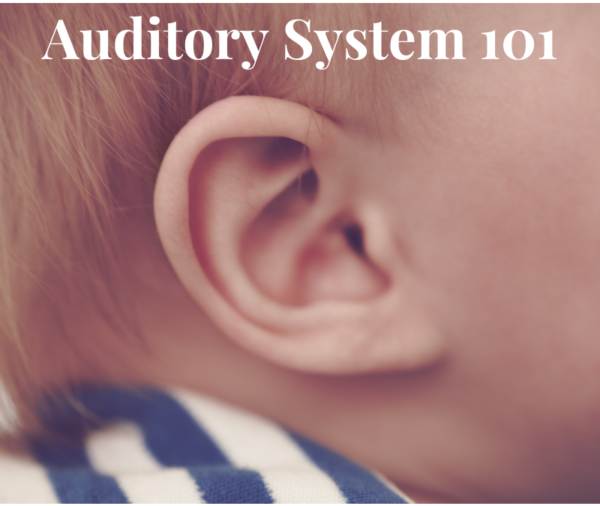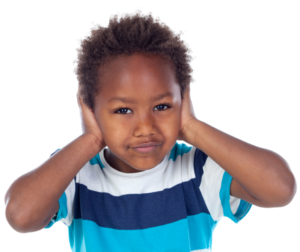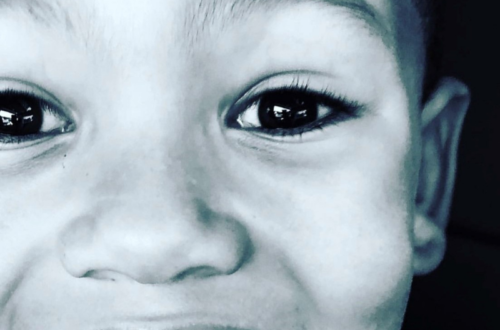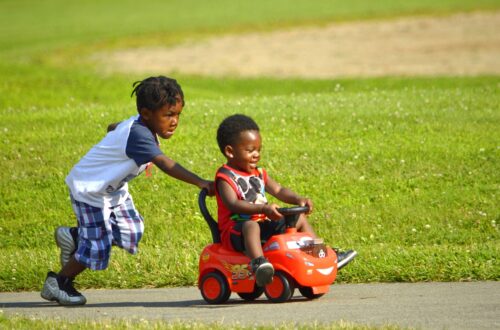
Auditory System 101

Welcome back! We are in week 3 of the sensory system series and this week we will explore the Auditory System. This system is responsible for hearing, interpreting and processing sound, locating sound, and filtering sound. We are born with this system either turned on or off, we are either born with hearing or are born deaf. We are constantly processing sound, whether we are tuned into or not. This system is first developed as a protective or defensive system. When babies are first hearing sounds, they are startled and cry. Eventually the brain learns what sounds to be wary of and what sounds are safe, which is the discriminatory role of the auditory sensory system.
The auditory system is also closely related to the vestibular system, which is why movement and language can go hand in hand for improving speech delays in many children. We will explore more of this topic during the week we discuss the vestibular system.
Dysfunction in the auditory system can present in sensitivity or lack there of to sounds, such as a child that becomes upset by fireworks or a child that doesn’t seem to hear you when you call them unless you have their eye contact. Some people have difficulty tuning out sound or becoming easily distracted by sound, as if they have super sonic hearing- they can hear a truck from far away. Some children having difficulty following directions, which may be an issue with auditory processing, or tuning into one person’s voice if there is ambient sound or even humming of fluorescent lights in a classroom or home. Some children also becoming easily upset or disturbed by loud noises, such as vacuum, blender, or fire truck. All of these instances can disrupt the flow of learning and play and make focusing challenging for a child or an adult.

Take a moment and think about how noise or sounds effect you. Do you need white noise to go to sleep? Do you need a specific type of music to get attend to certain tasks, such as focused work, housework, or creative endeavors? How does sound affect your mood? Your sleep? Your concentration? What are you able to filter out and what is difficult for you to filter out? As a therapist these are questions I am always asking myself when I am working with a child. Sound can be a very powerful therapy tool which can alter a child’s ability to attend, learn, and focus on a task for longer or blocking out sound can also be a powerful tool to help a child feel more in control of sounds so they can enjoy being a part of activities that may have been challenging in the past.

Here are some ideas that you can use to help strengthen or calm the system. Please reach out to me or your local OT for more specific suggestions for your child.
Simple Activities or Tools to Strengthen System:
- Use sound cancelling over the ear headphones or ear plugs to reduce sensitivity
- Use rhythmic beats, such as drumming music or classical music to help with auditory distractibility, processing, and motor rhythm.
- Use white noise machine to help with sleep or when needing to concentrate
- Try different therapeutic listening programs to encourage auditory processing.
- Make sure you have eye contact before giving a direction
- Use simple language
- Use visual modeling along with directions to ensure a multisensory approach
- Allow your child to help turn on household equipment such as vacuum or blender to give them a sense of control over the sound.
- Give verbal warnings for anticipated loud sounds so the child can prepare
Please leave your comments below to share your experiences and thoughts! Also don’t forget to download this week’s auditory system printable!




